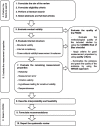Psychometric properties of medication adherence instruments in cardiovascular diseases and type 2 diabetes mellitus: systematic review protocol
- PMID: 34238365
- PMCID: PMC8268561
- DOI: 10.1186/s13643-021-01755-w
Psychometric properties of medication adherence instruments in cardiovascular diseases and type 2 diabetes mellitus: systematic review protocol
Abstract
Background: The pharmacological treatment of cardiovascular diseases and type 2 diabetes mellitus reduces the risk of cardiovascular events.; however, most patients do not adhere to the treatment. There are several self-reported measures for assessing medication adherence. Identifying the instruments with the best psychometric evidence is essential for selecting an accurate measure. The aim of this study is to critically assess, compare and synthesize the quality of the measurement properties of patient-reported outcome measures to access medication adherence among patients with cardiovascular diseases and/or type 2 diabetes mellitus.
Methods: This protocol is reported according to Preferred Reporting Items for Systematic Review and Meta-Analysis Protocols (PRISMA-P) and the COnsensus-based Standards for the selection of health Measurement INstruments (COSMIN) guidelines. The following databases will be searched: Web of Science, SCOPUS, PubMed, CINAHL, EMBASE, LILACS, PsycINFO and ProQuest.
Discussion: This review will provide a detailed assessment of the measurement properties of self-reported medication adherence instruments in patients with cardiovascular diseases and/or type 2 diabetes mellitus to support clinical practice and research.
Systematic review registration: PROSPERO CRD42019129109.
Keywords: Cardiovascular diseases; Diabetes mellitus; Medication adherence; Patient reported outcome measures; Psychometrics; Reproducibility of results; type 2.
Conflict of interest statement
The authors have no competing interests to declare.
Figures

References
-
- World Health Organization. Global Status Report on noncommunicable diseases 2014. Geneva: WHO. 2014. Available from: https://www.who.int/nmh/publications/ncd-status-report-2014/en/. - PubMed
Publication types
MeSH terms
LinkOut - more resources
Full Text Sources
Medical

